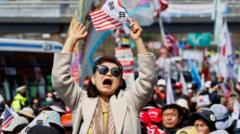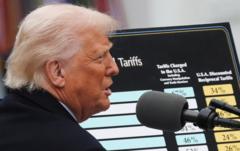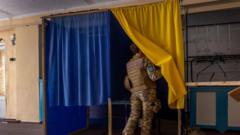The unanimous decision by South Korea's Constitutional Court to remove President Yoon Suk Yeol has opened a new chapter in the nation's political landscape, with intense calls for a snap election and concerns over public trust and unity.**
South Korea Faces Uncertainty After Presidential Impeachment**

South Korea Faces Uncertainty After Presidential Impeachment**
The removal of President Yoon Suk Yeol has left South Korea at a crossroads, prompting a pivotal election and widespread division among its citizens.**
South Korea is poised for a monumental shift in governance as President Yoon Suk Yeol has been officially removed from office following a unanimous ruling by the Constitutional Court. The court upheld Yoon’s impeachment on grounds of attempting to impose martial law, an act that sparked widespread protests and fears among the populace.
Yoon, who was suspended after a controversial military takeover attempt on December 3, saw his supporters and critics alike gathered to witness the court's decision in real-time, a moment met with a mix of jubilation and sorrow. With an election to appoint his successor mandated by June 3, South Koreans are now faced with the immediate task of selecting a new leader.
The removal of Yoon has been met with relief from many, offering a sense of closure after months of political turmoil. However, the shadow of his attempted authoritarian rule looms large, stirring memories of South Korea’s historical struggles against dictatorship. Yoon’s actions that night—ordering military troops to storm parliament—have raised alarm bells about the possibility of similar power grabs in the future.
The Constitutional Court's vehement condemnation of Yoon’s behavior, which it deemed both unjustified and detrimental to democratic principles, further indicates a significant moment for South Korea's constitutional integrity. Acting court president Moon Hyung-bae emphasized that Yoon's heavy-handed tactics not only violated citizens' political rights but also disrupted adherence to the rule of law.
In the aftermath of his removal, South Korea is experiencing heightened polarization, with Yoon's refusal to concede further fracturing the political landscape. While many denounce his self-portrayal as a martyr fighting against "communist" forces, dissatisfaction with the establishment and conspiracy theories have taken root across the nation's social fabric. This discontent is evidenced by consistent protests, particularly from Yoon's loyal supporters who feel betrayed, echoing beliefs that elections and the judiciary are compromised.
As South Korea prepares for a new election, the prevailing atmosphere of mistrust poses significant challenges. Survey results indicate that a notable percentage of citizens do not trust the ruling, raising concerns about the legitimacy of the upcoming elections. In response, political leaders are urging unity to help stabilize the nation and pave the way for constructive governance.
Despite his removal, Yoon’s legal troubles continue, with further criminal charges for insurrection pending. His situation is reminiscent of past political upheavals in South Korea, including the impeachment of former president Park Geun-hye over scandalous corruption.
As the nation grapples with the implications of Yoon's impeachment and prepares for its next steps, the call for a unified, trustworthy leadership has never been more urgent. The road ahead appears fraught with challenges, but many hope for a restored sense of democracy and public trust as South Korea navigates this pivotal moment in its history.


















